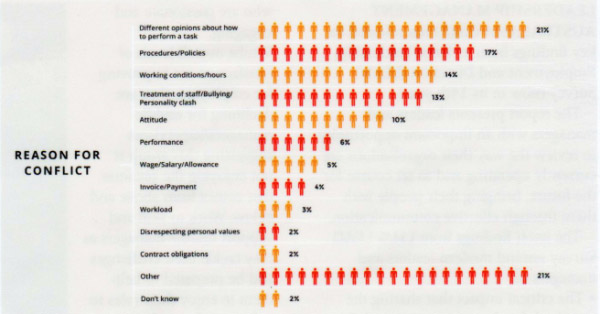
“Conflict is an inevitable part of the work environment – the question for management is not how to avoid it but how to manage it effectively.”
New research into the extent of conflict in New Zealand workplaces has found that within a 12 month period almost one quarter (24 percent) of employees had experienced at least one disagreement or argument at work that distracted or prevented them from doing their job.
The results suggest that loss of productivity due to workplace conflict is significant – particularly given that a third of those disagreements lasted for longer than one month.
The research, commissioned by FairWay Resolution, was designed to collect baseline data and insights into the extent and nature of conflict across New Zealand workplaces. The results were based on a sample of 411 wage and salary earners from across the public and private sectors.
FairWay Resolution Chief Executive Greg Pollock says the research sheds light on a subject that is all to often hidden from the balance sheet.
“This research underlines the need to recognise that workplace conflict exists and that if not managed effectively it can substantially erode productivity – whether through increased absenteeism, staff turnover, failure to meet targets, lost business efficiency or damaged business relationships.”
FairWay’s research identified that the most common workplace conflicts were over differences of opinion about how to perform a task (21 percent) and procedures or policies not being followed (17 percent).
The most common initial reaction to workplace conflict was anger (83 percent) followed by stress (57 percent). Work-related consequences included: losing focus (46 percent), avoiding communication with the other party (37 percent) and reduced motivation (33 percent).
Other impacts were missing deadlines, loss of confidence and making mistakes. Respondents reported taking time off as a response to conflict, leaving the employment by choice or dismissal.
The negative personal effects of conflict were amplified by two thirds of respondents asking for help from their managers, but only half receiving satisfactory support in the workplace. Only six percent of those in conflict called on their HR team to help them manage the conflict.
Mr Pollock says while we tend to think of ‘conflict’ as negative, it’s how conflict is approached that makes the difference.
“Conflict is an inevitable part of the work environment – the question for management is not how to avoid it but how to manage it effectively.”
FairWay’s research initiative has been endorsed by Business NZ, who agree that workplace conflict itself is not the problem; it is how it is managed that matters.
“If conflict is not managed trust evaporates, friendships dissolve, integrity shrivels and teams fail,” says Business NZ Employment Relations Policy Manager, Paul MacKay. “On the other hand transparent and well managed conflict can engender respect and promote co-operation and teamwork – all of which are success factors in any relationship.”
FairWay’s research is the first New Zealand study to measure the incidence and impacts of workplace conflict and is modelled on similar international studies. A comprehensive UK study (CEDR 2006) put the cost of conflict in British businesses at 33 billion per annum.
Fairway Resolution is an independent Crown-owned company, which provides specialist conflict management and dispute resolution services between organisations and the people with whom they come into contact.
Resource: Management magazine, October 2014
